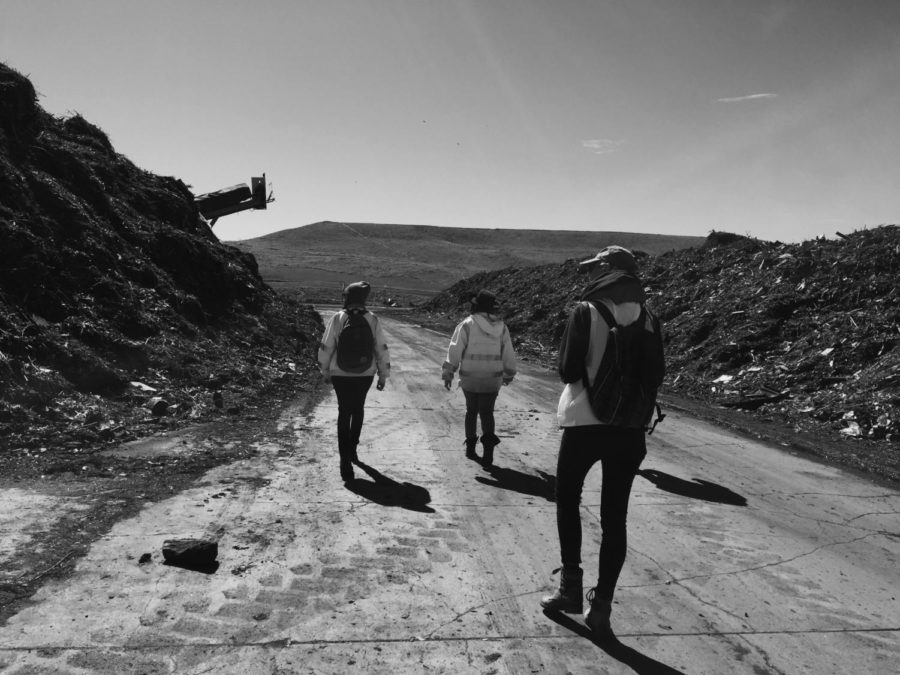Jennifer Starkweather’s artist residency comes to an end
Throughout the past year, Urban art teacher Jennifer Starkweather and her frequent collaborator Amanda Hughen have not only been working their day jobs, but they have also been engaged in a special environment-focused artist residency at Recology.
Recology is the private company that collects your compost, trash, and recycling, and it also sponsors artists to create work using the resources that are in the Recology dump. The typical Recology residency includes a stipend, a studio workspace, and access to Recology’s trash, recycling, and compost centers.
As well as making use of San Francisco’s garbage, the program is intended to work as a community builder and a tool to raise awareness about waste. Deborah Monk, manager of the Artists in Residence program at Recology, said in an interview for the Urban Legend that “people come to the art openings again and again, and we build community between the kids that come on tours and people that come to openings.” Monk believes that “there is value in [the artist residency program] to help people really think about the things that we buy and the things that we need.”
While the typical Recology residency is around four months long and is fairly strict in its expectation and deadlines for its artists, Starkweather and Hughen were offered special residencies, which gave them more freedom within the residency guidelines to create their own timeline.
The duo first made a connection with Monk at a food and climate-focused event. After Hughen and Starkweather made a speech about their work, the three shared a conversation that led to Monk offering them the special residency several days later.
“What was very appealing to me was the duality of [Starkweather and Hughen] being both artists and researchers,” said Monk. What made Hughen and Starkweather stand out was their “history of doing really important research projects” for their other work, which is typically focused on environmental features and their shifts due to climate change. “There’s so much to understand about composting and recycling that I thought they would be a perfect fit here,” said Monk.
The pair lived up to their reputation and delved into research to deeply understand compost and food waste. They dedicated most of the year they spent working on the project to research. Starkweather said they “came into [the residency] not knowing a lot about the inner working of compost, carbon storage, and food waste”. “[We] ended up going beyond just book and article research,” said Starkweather. They focused on using Recology’s connections to meet people that work closely with compost.
As opposed to making their work out of garbage, Hughen and Starkweather responded to what they saw and learned by creating abstract works on paper. The pieces reference the shapes of plastic food packaging to create forms referencing molecular structures, landscapes, and biochemical processes.
Through their exploration of food waste, they learned about “the potential of compost and soil to mitigate climate change,” said Hughen. Hughen explained that soil is most fertile when it is carbon-rich, but when soil is tilled it becomes carbon-poor and less fertile. Tilling, the process of turning over the soil, causes carbon to enter the atmosphere, causing global warming. Many environmental activists advocate for a no-till method of farming to reduce carbon emissions. Compost also has potential to reduce greenhouse gas emissions. “By composting [we’re] rescuing food waste from the landfill where it creates methane gas,” Hughen said. “There’s so much potential for using compost, and especially compost from individuals versus industrial compost.”
Composting is a form of environmental conservation that, although being “on an individual level, can make a real difference”, said Hughen. While typically one person’s efforts can only create a small impact, composting empowers the consumer to support real change in our battle against global warming.
Starkweather and Hughen’s residency culminated in an exhibition of their series titled Black Gold at Recology San Francisco on Friday, September 21. “Amanda and I always feel both tired and energized at the conclusion of a project–glad it’s over but also excited to revisit and rework some of our ideas further,” said Starkweather.

